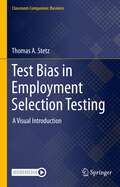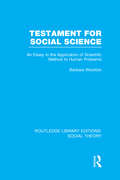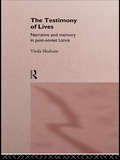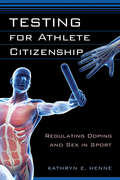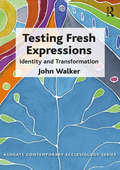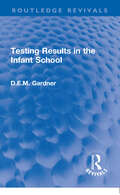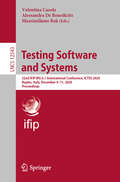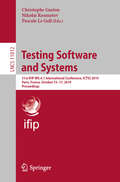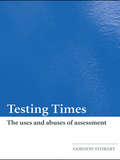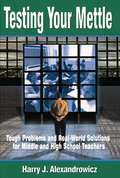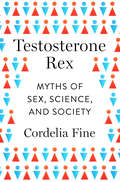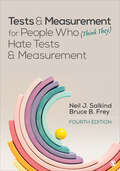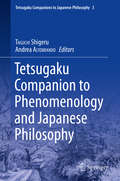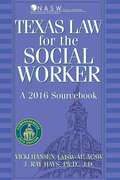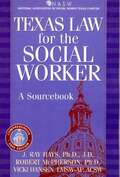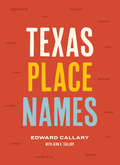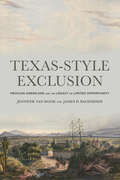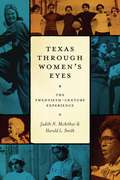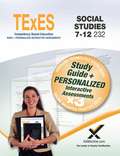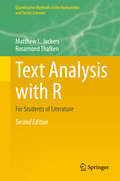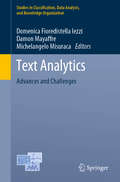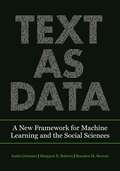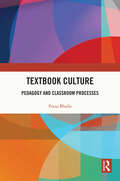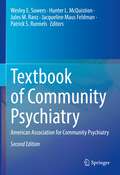- Table View
- List View
Test Bias in Employment Selection Testing: A Visual Introduction (Classroom Companion: Business)
by Thomas A. StetzThis book provides students with a concise introduction to test bias from a psychometric point-of-view without statistics. It uses easy to understand graphs to explain complex technical approaches to test bias giving readers a highly sought-after knowledge enabling them to be better consumers of tests.Studies performed by the Society for Human Resource Management (SHRM) consistently show that selection is a key competency for Human Resource (HR) professionals. Knowledge of test bias is a key component to effectively and legally performing this highly valued HR function. Unfortunately, test bias is rarely covered in HR classes or is presented in a highly technical manner geared to individuals with strong statistical and mathematical backgrounds. This book, requiring no previous statistical or mathematical knowledge, can be used as a supplemental textbook for any class that deals with selection, staffing, or measurement at the undergraduate or graduate level.
Testament for Social Science: An Essay in the Application of Scientific Method to Human Problems (Routledge Library Editions: Social Theory Ser.)
by Barbara WoottonThe contrast between man’s amazing ability to manipulate his world and his pitiful incompetence in managing his own affairs is now as commonplace as it is tragic. It is by rigorous devotion to scientific method that we have made our conquests over the material environment; it is obvious that this method is not normally applied to the field of relations of human beings, individual and collective. These are conducted in a quite different way, governed by a medley of primitive impulses set in a framework of a traditional morality that varies from place to place and age to age. In these matters science plays little part; yet more than a century has passed since Auguste Comte said that the rational reform of society must be brought about by the application of scientific method to social problems. It is, therefore, the first purpose of this essay to ask how far social problems might be tackled by the methods of science.
The Testimony of Lives: Narrative and memory in post-Soviet Latvia
by Vieda SkultansVieda Skultans left Latvia as a refugee at the age of six months. In 1990, she returned for the first time. This text is both a personal account of a homecoming and an anthropology of a people trying to come to terms with its past and to face an uncertain future. Based on more than 100 interviews carried out in the wake of Latvian independence, it gives voice to stories of dispossession and exile and of ambiguous returns. At the same time it unpicks the process of memory itself, showing how personal memory is shaped by the traditional narratives of national history and culture.
Testing for Athlete Citizenship
by Kathryn E. HenneIncidents of doping in sports are common in news headlines, despite regulatory efforts. How did doping become a crisis? What does a doping violation actually entail? Who gets punished for breaking the rules of fair play? In Testing for Athlete Citizenship, Kathryn E. Henne, a former competitive athlete and an expert in the law and science of anti-doping regulations, examines the development of rules aimed at controlling performance enhancement in international sports. As international and celebrated figures, athletes are powerful symbols, yet few spectators realize that a global regulatory network is in place in an attempt to ensure ideals of fair play. The athletes caught and punished for doping are not always the ones using performance-enhancing drugs to cheat. In the case of female athletes, violations of fair play can stem from their inherent biological traits. Combining historical and ethnographic approaches, Testing for Athlete Citizenship offers a compelling account of the origins and expansion of anti-doping regulation and gender-verification rules. Drawing on research conducted in Australasia, Europe, and North America, Henne provides a detailed account of how race, gender, class, and postcolonial formations of power shape these ideas and regulatory practices. Testing for Athlete Citizenship makes a convincing case to rethink the power of regulation in sports and how it separates athletes as a distinct class of citizens subject to a unique set of rules because of their physical attributes and abilities.
Testing Fresh Expressions: Identity and Transformation (Routledge Contemporary Ecclesiology)
by John WalkerTesting Fresh Expressions investigates whether fresh expressions of church really do what is claimed for them by the fresh expressions movement and, in particular, whether their unique approach helps to reverse trends of decline experienced by traditional churches. Part 1 examines those claims and untangles their sociological and theological assumptions. From a careful study of factors underlying attendance decline and growth, Part 2 argues that long-term decline can be resisted only if churches are better able to attract children, the non-churched or both. Part 3 tests the comparative ability of a group of growing parish churches and a group of fresh expressions to resist trends of decline and discovers some intriguing social dynamics common to both groups. Part 4 argues that fresh expressions do not fulfil the unique role often claimed for them but that they do have the capacity to help reinvigorate the whole church.
Testing Results in the Infant School (Routledge Revivals)
by D.E.M. GardnerFirst published in 1942, Testing Results in the Infant School describes an attempt to measure objectively the results of education in Infant schools where children are free to move and speak and play, as compared with schools of a more formal and traditional type. The book explains in detail the variety of tests used, the reasons behind them, and the children’s reactions to them. It concludes with an evaluation of the results and suggestions for their bearing on educational practice. It will appeal to those with an interest in the history, theory, and psychology of education.
Testing Software and Systems: 32nd IFIP WG 6.1 International Conference, ICTSS 2020, Naples, Italy, December 9–11, 2020, Proceedings (Lecture Notes in Computer Science #12543)
by Valentina Casola Alessandra De Benedictis Massimiliano RakThis book constitutes the refereed proceedings of the 32nd IFIP WG 6.1 International Conference on Testing Software and Systems, ICTSS 2020, which was supposed to be held in Naples, Italy, in December 2020, but was held virtually due to the COVID-19 pandemic.The 17 regular papers and 4 short papers presented were carefully reviewed and selected from 43 submissions. ICTSS is a series of international conferences addressing the conceptual, theoretic, and practical problems of testing software systems, including communication protocols, services, distributed platforms, middleware, embedded and cyber-physical systems, and security infrastructures. The papers are organized in the topical sections named: model-based testing; security testing; testing methods and applications; testing methods and automation; and short contributions.
Testing Software and Systems: 31st IFIP WG 6.1 International Conference, ICTSS 2019, Paris, France, October 15–17, 2019, Proceedings (Lecture Notes in Computer Science #11812)
by Christophe Gaston Nikolai Kosmatov Pascale Le GallThis book constitutes the refereed proceedings of the 31st IFIP WG 6.1 International Conference on Testing Software and Systems, ICTSS 2019, held in Paris, France, in October 2019. The 14 regular papers and 3 short papers presented were carefully reviewed and selected from 30 submissions. This year also included an additional industrial paper. ICTSS is a series of international conferences addressing the conceptual, theoretic, and practical problems of testing software systems, including communication protocols, services, distributed platforms, middleware, embedded and cyber-physical systems, and security infrastructures.
Testing Times: The Uses and Abuses of Assessment
by Gordon StobartAssessment dominates our lives but its good intentions often produce negative consequences. An example that is central to this book is how current forms of assessment encourage shallow ‘for-the-test’ learning. It is true to say that as the volume of assessment increases, confidence in what it represents is diminishing. This book seeks to reclaim assessment as a constructive activity which can encourage deeper learning. To do this the purpose, and fitness-for–purpose, of assessments have to be clear. Gordon Stobart critically examines five issues that currently have high-profile status: intelligence testing learning skills accountability the ‘diploma disease’ formative assessment Stobart explains that these form the basis for the argument that we must generate assessments which, in turn, encourage deep and lifelong learning. This book raises controversial questions about current uses of assessment and provides a framework for understanding them. It will be of great interest to teaching professionals involved in further study, and to academics and researchers in the field.
Testing Your Mettle: Tough Problems and Real-World Solutions for Middle and High School Teachers
by Harry J. AlexandrowiczIn this straightforward guide to what really happens in classrooms and hallways, veteran teacher and administrator Harry J. Alexandrowicz makes “reality training” available to both novice and experienced teachers. Alexandrowicz draws from his 28 years’ experience in schools to help prepare teachers to handle the inevitable legal, philosophical, and common-sense challenges they face every day. These challenges are presented as brief vignettes followed by four possible solutions with space for the educators to write their proposed actions, followed by sections on what actually happened, and why. The kinds of scenarios you will learn about include: A parent threatens you You witness students hazing another student You discover a gun in a student’s locker The school’s best athlete is failing your class You see inappropriate student behavior outside the classroom. This accessible “insider’s” view of the classroom will be an essential resource for teachers, administrators, and parents who want to gain valuable insights into how to handle what really happens in schools today.
Testosterone Rex: Myths of Sex, Science, and Society
by Cordelia Fine“Goodbye, beliefs in sex differences disguised as evolutionary facts. Welcome the dragon slayer: Cordelia Fine wittily but meticulously lays bare the irrational arguments that we use to justify gender politics.”—Uta Frith, emeritus professor of cognitive development, University College London Many people believe that, at its core, biological sex is a fundamental, diverging force in human development. According to this overly familiar story, differences between the sexes are shaped by past evolutionary pressures—women are more cautious and parenting-focused, while men seek status to attract more mates. In each succeeding generation, sex hormones and male and female brains are thought to continue to reinforce these unbreachable distinctions, making for entrenched inequalities in modern society. In Testosterone Rex, psychologist Cordelia Fine wittily explains why past and present sex roles are only serving suggestions for the future, revealing a much more dynamic situation through an entertaining and well-documented exploration of the latest research that draws on evolutionary science, psychology, neuroscience, endocrinology, and philosophy. She uses stories from daily life, scientific research, and common sense to break through the din of cultural assumptions. Testosterone, for instance, is not the potent hormonal essence of masculinity; the presumed, built-in preferences of each sex, from toys to financial risk taking, are turned on their heads. Moving beyond the old “nature versus nurture” debates, Testosterone Rex disproves ingrained myths and calls for a more equal society based on both sexes’ full, human potential.
Tests & Measurement for People Who (Think They) Hate Tests & Measurement
by Neil J. Salkind Bruce B. FreyWith a signature, conversational writing style and straightforward presentation, Neil J. Salkind’s best-selling Tests & Measurement for People Who (Think They) Hate Tests & Measurement guides readers through an overview of categories of tests, the design of tests, the use of tests, and some of the basic social, political, and legal issues that the process of testing involves. New co-author Bruce B. Frey has streamlined the table of contents for ease of use; added more content on validity and reliability throughout; more closely connected standardized tests to classroom instruction, adding more on classroom assessment; and added a chapter on surveys and scale development. An instructor website includes a test bank and PowerPoint slides.
Tests & Measurement for People Who (Think They) Hate Tests & Measurement
by Neil J. Salkind Bruce B. FreyWith a signature, conversational writing style and straightforward presentation, Neil J. Salkind’s best-selling Tests & Measurement for People Who (Think They) Hate Tests & Measurement guides readers through an overview of categories of tests, the design of tests, the use of tests, and some of the basic social, political, and legal issues that the process of testing involves. New co-author Bruce B. Frey has streamlined the table of contents for ease of use; added more content on validity and reliability throughout; more closely connected standardized tests to classroom instruction, adding more on classroom assessment; and added a chapter on surveys and scale development. An instructor website includes a test bank and PowerPoint slides.
Tetsugaku Companion to Phenomenology and Japanese Philosophy (Tetsugaku Companions to Japanese Philosophy #3)
by Shigeru Taguchi Andrea AltobrandoThis volume addresses the impact of the introduction of phenomenology in Japan and its interaction with Japanese philosophy. It is well known that phenomenology was introduced at a very early stage in Japan. Furthermore, phenomenology still constitutes one of the main currents of thought in Japan. However, the specific way in which phenomenology has interacted with the indigenous Japanese tradition of thought and Japanese culture has until now not been addressed in great detail. This volume fills that gap. It discusses in detail the encounter and the interaction between Japanese thought and phenomenological reflection, with special regards to the topics of awareness and the self, the experience of otherness, ethics, and metaphysical issues. The book shows how phenomenology has served, and still serves, Japan to re-comprehend its “own” tradition and its specific form(s) of culture. At the same time, it offers an example of how different cultures and traditions can be both preserved and developed in their reciprocal action. More in general, it advances the philosophical debate beyond cultural enclosures and beyond mere scholasticism. The phenomenological tradition has always been open to new and alien ideas. An encounter with Japanese philosophy can offer a new challenge to actual phenomenological thinking.
Texas Law For The Social Worker: A 2016 Sourcebook
by Vicki Hansen J. Ray HaysTEXAS LAW FOR THE SOCIAL WORKER: A 2016 SOURCEBOOK provides licensed social workers, social work students, and professors with the key legal and policy issues specific to the state of Texas today. Issues directly affecting practitioners and their students have been carefully selected from statutes, case laws, official archives of the Attorney General Opinions and Open Records Opinions, the Social Work Practice Act, and the NASW Code of Ethics. No other compilation of such critical, up-to-date material exists for the state of Texas. New up-to-date material from 83rd Legislative Session!
Texas Law for the Social Worker: A Sourcebook
by Jay Ray Hays Robert McPhersonTexas Law for the Social Worker provides licensed social workers, social work students, and professors with the key legal and policy issues specific to the state of Texas today. <p><p>Issues directly affecting practitioners and their students have been carefully selected from statutes, case laws, official archives of the Attorney General Opinions and Open Records Opinions. <p><p>No other compilation of such critical, up-to-date material exists for the state of Texas. Produced in collaboration with the Texas Psychological Association.
Texas Place Names
by Edward Callary Jean K. Callary&“[A] linguist . . . takes readers on a tour across the state, using names and language to tell its history.&” ―Alcalde Was Gasoline, Texas, named in honor of a gas station? Nope, but the name does honor the town&’s original claim to fame: a gasoline-powered cotton gin. Is Paris, Texas, a reference to Paris, France? Yes: Thomas Poteet, who donated land for the town site, thought it would be an improvement over &“Pin Hook,&” the original name of the Lamar County seat. Ding Dong&’s story has a nice ring to it; the name was derived from two store owners named Bell, who lived in Bell County, of course. Tracing the turning points, fascinating characters, and cultural crossroads that shaped Texas history, Texas Place Names provides the colorful stories behind these and more than three thousand other county, city, and community names. Drawing on in-depth research to present the facts behind the folklore, linguist Edward Callary also clarifies pronunciations (it&’s NAY-chis for Neches, referring to a Caddoan people whose name was attached to the Neches River during a Spanish expedition). A great resource for road trippers and historians alike, Texas Place Names alphabetically charts centuries of humanity through the enduring words (and, occasionally, the fateful spelling gaffes) left behind by men and women from all walks of life. &“[A] quite useful book.&” ―Austin American-Statesman
Texas-Style Exclusion: Mexican Americans and the Legacy of Limited Opportunity
by Jennifer Van Hook James D. BachmeierWhile Americans largely support legal immigration, this support is conditional on the basis that immigrants do not make use of public assistance. Previous generations of immigrants, such as European-origin Industrial Era immigrants, came to U.S. impoverished, worked hard, and achieved the American Dream seemingly on their own. Mexican immigrants, the nation’s largest contemporary immigrant group, are often viewed with suspicion and are accused of being dependent on the government and refusing to integrate into American society the “right way.” In Texas-Style Exclusion, sociologists Jennifer Van Hook and James D. Bachmeier investigate such claims by comparing how American society has responded to different groups of immigrants over time. Drawing on census and archival data on the quality of public schooling, Van Hook and Bachmeier find that Industrial Era European immigrants, who were primarily located in the northeastern U.S., benefited from programs and policies championed by the Americanization and Progressive movements. The Americanization movement sought to help acclimate new arrivals and transform “foreigners” into “Americans” by providing night school programs to promote civic integration and basic education, as well as other services. The Progressive movement, which aimed to improve education, work, and health conditions, sought to expand investment in public schools and make primary and secondary schooling mandatory, which kept working class children in school as opposed to entering the workforce. This access to education allowed for integration and astonishing intergenerational mobility. Mexican immigrants in the 1920s and 1930s, the majority of whom resided in Texas, had radically different experiences from their European counterparts. Mexicans in Texas were subjected to racism, segregation, labor exploitation, and intentional school failures. This resulted in tremendous generational disadvantage that persists to the current day. Mexicans from this cohort who left Texas for states with strong Americanization and Progressive movements saw improved educational outcomes and integration. Additionally, Mexicans who immigrated after the Civil Rights Movement saw significantly greater inter-generational mobility and educational attainment than earlier cohorts due to the protections provided by civil rights laws. Van Hook and Bachmeier conclude that whether one is optimistic or pessimistic about the integration of Mexican Americans depends on when and where one looks. Texas-Style Exclusion is an engaging examination of policies and practices that have been glossed over and forgotten that promoted mobility and integration for certain immigrant groups and impeded them for others.
Texas Through Women's Eyes
by Judith N. Mcarthur Harold L. SmithTexas women broke barriers throughout the twentieth century, winning the right to vote, expanding their access to higher education, entering new professions, participating fully in civic and political life, and planning their families. Yet these major achievements have hardly been recognized in histories of twentieth-century Texas. By contrast, Texas Through Women’s Eyes offers a fascinating overview of women’s experiences and achievements in the twentieth century, with an inclusive focus on rural women, working-class women, and women of color. McArthur and Smith trace the history of Texas women through four eras. They discuss how women entered the public sphere to work for social reforms and the right to vote during the Progressive era (1900–1920); how they continued working for reform and social justice and for greater opportunities in education and the workforce during the Great Depression and World War II (1920–1945); how African American and Mexican American women fought for labor and civil rights while Anglo women laid the foundation for two-party politics during the postwar years (1945–1965); and how second-wave feminists (1965–2000) promoted diverse and sometimes competing goals, including passage of the Equal Rights Amendment, reproductive freedom, gender equity in sports, and the rise of the New Right and the Republican party.
TExES Social Studies 7-12: Teacher Certification Exam Guide
by Sharon WynneAre you ready to teach Social Studies in Texas? Use our high quality study guide to help you pass your teacher certification exam and advance your career. Our TExES Social Studies 7-12 study guide offers total preparation for prospective Texas teachers to get ready for the TExES Social Studies 7-12 exam. Three 120 question skill-aligned tests cover the following Domains: I. World History (15%), II U. S. History (20%) III. Texas History (13%) IV. Geography, Culture and the Behavioral and Social Sciences (13%) V. Government and Citizenship (13%) VI. Economics and Science, Technology and Society (13%) VII. Social Studies Foundations, Skills, Research and Instruction (13%). These are broken down to 9 Competencies, and further to 70 Skills. Utilizing this guide will ensure that you have experience with all of the specific competencies and skills within the three Domains. The TExES Social Studies 7-12 (232) study guide is designed to assess whether an examinee has the requisite knowledge and skills that an entry-level educator in this field in Texas public schools must possess. Our three tests each contain 140 skill-aligned multiple-choice questions based on the Social Studies 7-12 test framework. Questions on this test range from grades 7-12. Common Core and TEKS standards have been added to this edition. As you prepare for your exam, have confidence knowing that the information provided has been correlated directly to Texas's expected teaching and learning skills, and is the best way to help guide you to success on your TExES Social Studies Exam.
Text Analysis with R: For Students of Literature (Quantitative Methods in the Humanities and Social Sciences)
by Matthew L. Jockers Rosamond ThalkenNow in its second edition, Text Analysis with R provides a practical introduction to computational text analysis using the open source programming language R. R is an extremely popular programming language, used throughout the sciences; due to its accessibility, R is now used increasingly in other research areas. In this volume, readers immediately begin working with text, and each chapter examines a new technique or process, allowing readers to obtain a broad exposure to core R procedures and a fundamental understanding of the possibilities of computational text analysis at both the micro and the macro scale. Each chapter builds on its predecessor as readers move from small scale “microanalysis” of single texts to large scale “macroanalysis” of text corpora, and each concludes with a set of practice exercises that reinforce and expand upon the chapter lessons. The book’s focus is on making the technical palatable and making the technical useful and immediately gratifying. Text Analysis with R is written with students and scholars of literature in mind but will be applicable to other humanists and social scientists wishing to extend their methodological toolkit to include quantitative and computational approaches to the study of text. Computation provides access to information in text that readers simply cannot gather using traditional qualitative methods of close reading and human synthesis. This new edition features two new chapters: one that introduces dplyr and tidyr in the context of parsing and analyzing dramatic texts to extract speaker and receiver data, and one on sentiment analysis using the syuzhet package. It is also filled with updated material in every chapter to integrate new developments in the field, current practices in R style, and the use of more efficient algorithms.
Text Analytics: Advances and Challenges (Studies in Classification, Data Analysis, and Knowledge Organization)
by Domenica Fioredistella Iezzi Damon Mayaffre Michelangelo MisuracaFocusing on methodologies, applications and challenges of textual data analysis and related fields, this book gathers selected and peer-reviewed contributions presented at the 14th International Conference on Statistical Analysis of Textual Data (JADT 2018), held in Rome, Italy, on June 12-15, 2018. Statistical analysis of textual data is a multidisciplinary field of research that has been mainly fostered by statistics, linguistics, mathematics and computer science. The respective sections of the book focus on techniques, methods and models for text analytics, dictionaries and specific languages, multilingual text analysis, and the applications of text analytics. The interdisciplinary contributions cover topics including text mining, text analytics, network text analysis, information extraction, sentiment analysis, web mining, social media analysis, corpus and quantitative linguistics, statistical and computational methods, and textual data in sociology, psychology, politics, law and marketing.
Text as Data: A New Framework for Machine Learning and the Social Sciences
by Justin Grimmer Margaret E. Roberts Brandon M. StewartA guide for using computational text analysis to learn about the social world From social media posts and text messages to digital government documents and archives, researchers are bombarded with a deluge of text reflecting the social world. This textual data gives unprecedented insights into fundamental questions in the social sciences, humanities, and industry. Meanwhile new machine learning tools are rapidly transforming the way science and business are conducted. Text as Data shows how to combine new sources of data, machine learning tools, and social science research design to develop and evaluate new insights.Text as Data is organized around the core tasks in research projects using text—representation, discovery, measurement, prediction, and causal inference. The authors offer a sequential, iterative, and inductive approach to research design. Each research task is presented complete with real-world applications, example methods, and a distinct style of task-focused research.Bridging many divides—computer science and social science, the qualitative and the quantitative, and industry and academia—Text as Data is an ideal resource for anyone wanting to analyze large collections of text in an era when data is abundant and computation is cheap, but the enduring challenges of social science remain.Overview of how to use text as dataResearch design for a world of data delugeExamples from across the social sciences and industry
Textbook Culture: Pedagogy and Classroom Processes
by Pooja BhallaThis volume captures the essence of schooling in a structural manner and explores the classroom life in the larger schooling context. The emphasis is to uncover the necessary framework of classroom that is significant to understand the place of textbooks in the Indian school education system. By the use of ethnographic vignettes, it brings out the multiple patterns of teacher- student's interactions as they occur in different textbook-based situations. Through this, it sheds light on the primacy of the textbook approach in the classroom processes.The book also investigates the ways through which the students respond to the different pedagogic situations. In doing so, it explores the notions of student boredom, alienation, inclusion and exclusion, and the array of student-textbook experiences that are pivotal to the shape and reshape the classroom processes in the larger pedagogical discourses.This book will be of interest to researchers, students, and teachers of education studies, sociology and politics of education, teacher education, childhood and youth studies, and urban studies. It will also be useful for education policymakers, and professionals in the development sector.
Textbook of Community Psychiatry: American Association for Community Psychiatry
by Wesley E. Sowers Hunter L. McQuistion Jules M. Ranz Jacqueline Maus Feldman Patrick S. RunnelsThe second edition of the AACP's (American Association for Community Psychiatry) Textbook of Community Psychiatry is a welcome update of this notable work that comprehensively presents the state of the art in this field. Along with continuously evolving scientific advances and principles of clinical care, community psychiatry must respond to shifts in public policy as well as economic climate. The past decade has witnessed significant political and social changes, including climate change, immigration levels, technological advancement, the influence of social media and the rise of political unrest. This new edition reflects these wider changes, incorporating new chapters and enhancing previous ones. It remains the standard text for certification of those working in healthcare and social welfare systems design and delivery of services. Readers will gain knowledge of:Basic pillars of the fieldEvidence based interventionsTelepsychiatry and technological aidsTrauma informed servicesIntegrated health systemsSocial determinants of healthStructural discrimination
